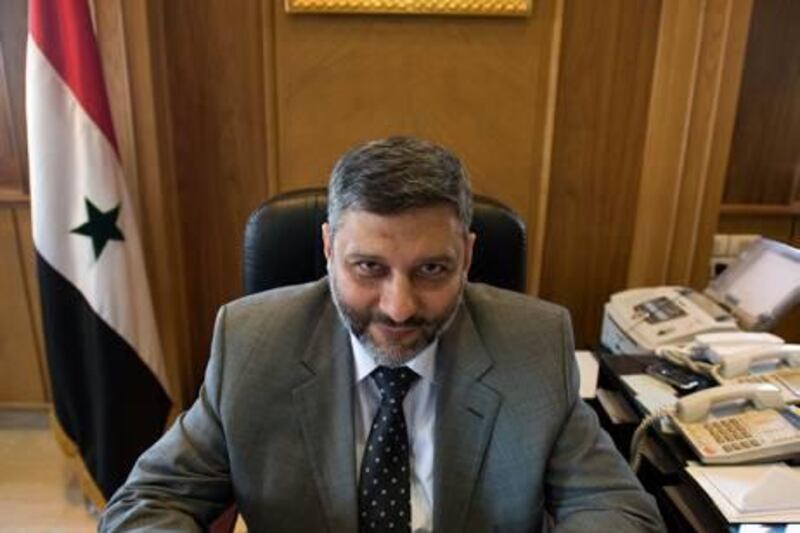DAMASCUS // A few months into his stewardship of one of the most influential religious offices in Syria, Mahmoud Abu Hudda Husseini, a liberal Islamic reformer intent on ending corruption, predicted he might not last long in the job.
"Maybe Aleppo needs two years to understand me," he said during an interview in May, just as his reforms were at their peak. "That's if I stay in my position that long."
Six months later, that forecast, made half jokingly, half seriously, was shown to be accurate, although the axe fell sooner than expected. On November 29, without ceremony or explanation, it was announced he had been removed from his position as director of religious endowments in the Aleppo governorate.
Renowned as an open-minded moderniser, Dr Husseini, who is a practising medical physician, had quickly and forcefully embarked on a programme of change that appears to have led to his downfall.
As director of Aleppo's religious endowments, the organisation managing Islamic affairs in the city and the province that shares its name, he was in charge of properties worth hundreds of millions of US dollars. They included commercial and residential buildings as well as 3,500 mosques and a dozen Islamic schools.
He also was in charge of the people who worked in those mosques and schools, including the preachers who gave sermons and administered Islamic education.
The reforms had a major effect on both the business and religion side of the Aleppo endowments' work. A paper-and-filing cabinet system of managing the enormous property portfolio was replaced by a computerised version. In the May interview, he made it clear that the computer system would help end institutionalised theft by powerful members inside his organisation. "Some properties owned by the endowment are being used by individuals for their own interests," he said. "These people take income from the property and don't give it to the endowment. We are now making sure that everything is on the right track."
As part of his drive to stop abuse, he dismissed dozens of salaried staff members and replaced them with volunteer workers he trusted.
Bureaucrats were not the only people to lose their positions. Religious leaders did too. In a highly controversial move, Dr Husseini insisted that all the preachers in Aleppo record their sermons and submit them to his offices. They were then evaluated to see if, in fact, the men genuinely knew their religion.
Those imams he deemed intolerant, repressive, or as advocating violence, were no longer allowed to deliver religious guidance and were, instead, offered re-education.
Unlike its more cosmopolitan sister Damascus, 370km to the south, Aleppo has a reputation as a stronghold for ultra conservative Islamic sentiments. Dr Husseini had made no secret that he intended to combat reactionaries. "I'm now head of an organisation that has the job to clean the environment fostering radicalism," he said.
The re-education of intolerant preachers was central to that project and sparked outrage among their ranks, although Syria's secular community and Aleppo's religious minorities enthusiastically supported it.
"I fired unqualified Quranic teachers, as well as those who were stealing from the endowment," he said in the May interview. "As a result, 30 per cent of the people here in Aleppo are lobbying against me. But that leaves 70 per cent who support me."
His reforms had, he said, created enemies - "some religious figures were against my appointment to this position" was how he put it - "but we are in a period of opening up to the world".
There has been no official reason given for Dr Husseini's sacking and replacement by Ahmad Issa Mohammad. His predecessor, Ahmad Qaddour, lost his job over "irregularities" in the collection of rental income on endowment properties.
But it is clear that Dr Husseini's programme to end corruption and liberalise Islamic institutions in Aleppo - a city where one leading preacher said any man who allows his wife to drive a car is no better than a pimp - was never going to be embraced without a struggle.
An Aleppo-based news website, Opposite Direction, asked why the government had removed him after such a short period and suggested the answer lay in his vigorous anti-corruption efforts.
"We know this man fought corruption and everyone in Aleppo knows he has a good reputation," the site said. Praising his reform agenda, the site said he had professionalised the endowments' operations and sought expert advice instead of treating the offices as a personal fiefdom.
"Mr Minister, do you feel that 10 months is enough to change him, while others have sat in their chairs for years, just giving promises, promises, promises and no deeds?" the site asked.
"We write this, not because we love Mr Husseini but because we hate the corruption that is such a heavy burden on us."





